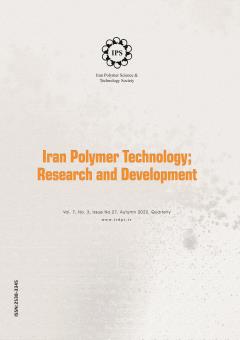مروري بر پوشش های آلی ضدخوردگی خطوط لوله مدفون انتقال نفت و گاز
الموضوعات : روش های پیشرفته شناسایی پلیمرها
1 - دانشگاه تهران
الکلمات المفتاحية: پوشش, خوردگی, لوله, مدفون, گاز ,
ملخص المقالة :
با توجه به گستردگی جغرافیایی و آبوهوای گرموخشک جنوب ایران که بخش اعظم تأسیسات نفت و گاز کشور در آن قرار دارد، مسئله خوردگی خطوط لوله مدفون انتقال نفت و گاز در صنعت نفت ایران از اهمیت خاصی برخوردار است. درحال حاضر استفاده از پوششهای آلی ضدخوردگی در کنار حفاظت کاتدی، موثرترین راه پیشگیری از خوردگی لوله های مدفون شناخته میشود. به این منظور، در این پژوهش ویژگی ها، قابلیت ها و عملکرد پوشش های اپوکسی، پلی ا ظلفینی، پلی یورتان و پلی اوره بررسی و مقایسه شده است. همچنین با توجه به نقش مهم تولید داخلی در صنعت نفت و گاز ایران، پوششهای شناختهشده و تجاری موجود داخلی معرفی گشته و بر لزوم توجه مضاعف به این عرصه و رسیدن به فناوریهای روز جهان تأکید گشته است. با توجه به اهمیت صنعت نفت وگاز در ایران، پیشرفتهای قابل توجهی در زمینه تولید داخلی پوششهای اپوکسی، پلیالفینی چندلایه و پلی یورتان صورت گرفته است. پوششهای پلیاوره، به نوعی نسل جدید پوششهای پلی یورتان هستند که مزایای رقابتی منحصربه فردی را ارائه داده که لزوم توجه ویژه به تولید داخلی آن را موکد میسازد.
1. Samimi A., Zarinabadi S., Application Polyurethane as Coating in Oil and Gas Pipelines, Int .J. Sci. Eng. Investig, 1, 43-45, 2012.
2. Branch M., Mahshahr I., Use of Polyurethane Coating to Prevent Corrosion in Oil and Gas Pipelines Transfer, Int. G. Res. Sci. Innov. Appl. Sci, 1, 2, 186-193, 2012.
3. Parkins R.N., A Review of Stress Corrosion Cracking of High Pressure Gas Pipelines, In Corrosion 2000. Onepetro, 2000.
4. Nesic S., Key Issues Related to Modelling of Internal Corrosion of Oil and Gas Pipelines–A review, Corros. Sci, 49, 4308-4338, 2007.
5. Velazguez J., Caleyo F., Valor A., and Hallen J., Predictive Model for Pitting Corrosion in Buried Oil and Gas Pipelines, Corros, 65, 5, 332-342, 2009.
6. Ferreira C.A.M., Ponciano J.A., Vaitsman D.S., and Perez D.V., Evaluation of the Corrosivity of the Soil Through its Chemical Composition, Sci. Total Environ , 388, 1-3, 250-255, 2007.
7. Robinson W., Testing Soil for Corrosiveness, Mater. Perform, United States, 32, 56-58, 1993.
8. Bradford S., Practical Handbook of Corrosion Control in Soils, second ed., CASTI Corrosion Series, Edmonton, Canada, 2000.
9. Tian-Bo S., External Fusion Bonded Epoxy Coating for Steel
Pipeline, Corros. Prot., 7, 374-377, 2006.
10. Papavanasm S., Revie R.W., Protective Pipeline Coating Evaluation, in Corrosion 2006, 2006.
11. Li C., Caob., Wu Y., An Electrochemical Method for Evaluating the Resistance to Cathodic Disbondment of Anti-Corrosion Coatings on Buried Pipelines, J. Sci. Technol, 14., 5, 414-419, 2007.
12. Njoku C. N., Bai W., Meng M., Arukalam I O., Njoku D I., and Li Y., Epoxy-Based Bi-Layer Self-Repairing Coating With Anti-Corrosive Functionalities for the Protection of A2024 Aluminum Alloy, Mater. Res. Express, 6, 115706, 2019.
13. Qi M., Availability of Coal tar Epoxy Used as Aanti-Corrosion, Coating for Underground, Pipelines, Adm. Inf. Technol, 2, 95-104, 2002.
14. Modiri B., Pourgol M., Yazdani M., Nasirpouri F., and Salehpour F., Piping Anti–Corrosion Coating Life Assessment, In Asme International Mechanical Engineering Congress and Exposition, 46637, V014T08A013, 2014.
15. Samimi A., Zarinabadi S., Shahbazi A.H., Azimi A., and Mirzaei M., Corrosion in Polyethylene Coatings Case Study: Cooling Water Pipelines, Chem. Methodol, 4, 378-399, 2020.
16. Aalund L., Polypropylene System Scores High as Pipeline Anti-Corrosion Coating," Oil. Gas. J., 90, 50, 1992.
17. Gaber M.A.W., Impact of Anti-Corrosion Liquid Epoxy and Fusion Bond Epoxy Primer on Mechanical Testing of Three Layers Polyethylene Pipeline Coating, Res. J. Appl. Sci, 8, 11, 5349-5359, 2012.
18. Branch M.,"Study an Analysis and Suggest New Mechanism of 3-layer Polyethylene Coating Corrosion Cooling Water Pipeline in Oil Refinery in Iran, Int. J. Res. Sci. Innov. Appl. Sci, 1, 2, 216-225, 2012.
19. Oertel G., Polyurethane Handbook, ed: Hanser Publisher. Munich Vienna, New York, 1985.
20. Chattopadhyay D., Mishra K., Sreedhar B., and RAJU K., Thermal and Viscoelastic Properties of Polyurethane-Imide/Clay Hybrid Coatings, Polym. Degrad. Stab., 91, 8, 1837-1849, 2006.
21. Manea M., Kirmaier L., and Sander J., Organic Coating Materials, in Anticorrosive Coatings: Vincentz Network, 37-98, 2014.
22. Samimi A., and Zarinabadi S., Application Polyurethane as Coating in Oil and Gas Pipelines, Int. J. Sci. Eng. Investig, 1, 8, 43-45, 2012.
23.Branch M., and Mahshahr I., Use of Polyurethane Coating to Prevent Corrosion in Oil and Gas Pipelines Transfer, Int.G. Res. Sci. Innov. Appl. Sci., 1, 186-193, 2012.
24. Samimi A., and Zarinabadi S., An Analysis of Polyethylene Coating Corrosion in Oil and Gas Pipelines, Am. J. Sci., 2011.
25. Bathaee A., Nourouzi S., Jamshidi Aval H., and Seyf S., Comparison and Study of Coating Properties of Three-Layer Polyethylene, Polyurethane and Fusion Bonded Epoxy for Pipelines," Petroleum Research, 28, 51-55, 2018.
26.Wel Y., Zhang L., and Ke W., Comparison of the Degradation Behavior of Fusion-Bonded Epoxy Powder Coating Systems Under Flowing and Static Immersion, Corros. Sci., 48,1449-1461, 2006.
27. Hnyp I., Zin Y.I., and Biliy L., Influence of Inhibitors on the Resistance of Polymeric Corrosion-Inhibiting Coatings to Cathodic Delamination, Mat. Sci., 47, 1, 108-113, 2011.
28. Howarth G. A., Polyurethanes, Polyurethane Dispersions and Polyureas: Past, Present and Future, Surf. Coat. Int., 86, 111-118, 2003.
29. Shojaei B., Najafi M., Yazdanbakhsh A., Abtahi M., and Zhang C., A Review on the Applications of Polyurea in the Construction Industry, Polym. Adv. Technol., 32, 2797-2812, 2021.
30. Deng P., Outward Investment by Chinese MNCs: Motivations and Implications, Bus. Horiz, 47, 8-16, 2004.
31. Toutanji H.A., Choi H., Wong D., Gilbert J. A., and D. J. Allddredge D.J., Applying a Polyurea Coating to High-Performance Organic Cementitious Materials, Constr. Build. Mater, 38, 1170-1179, 2013.


